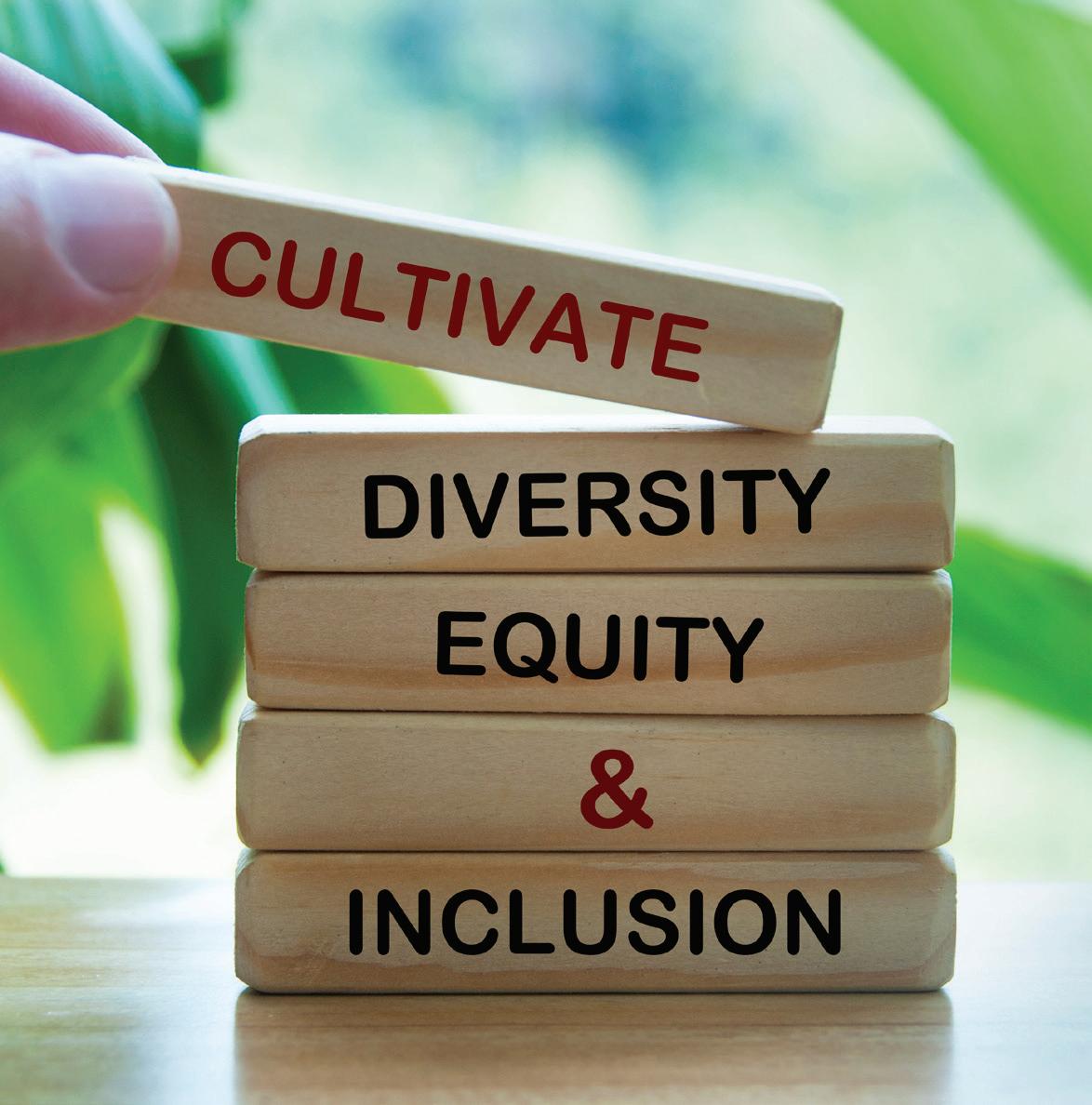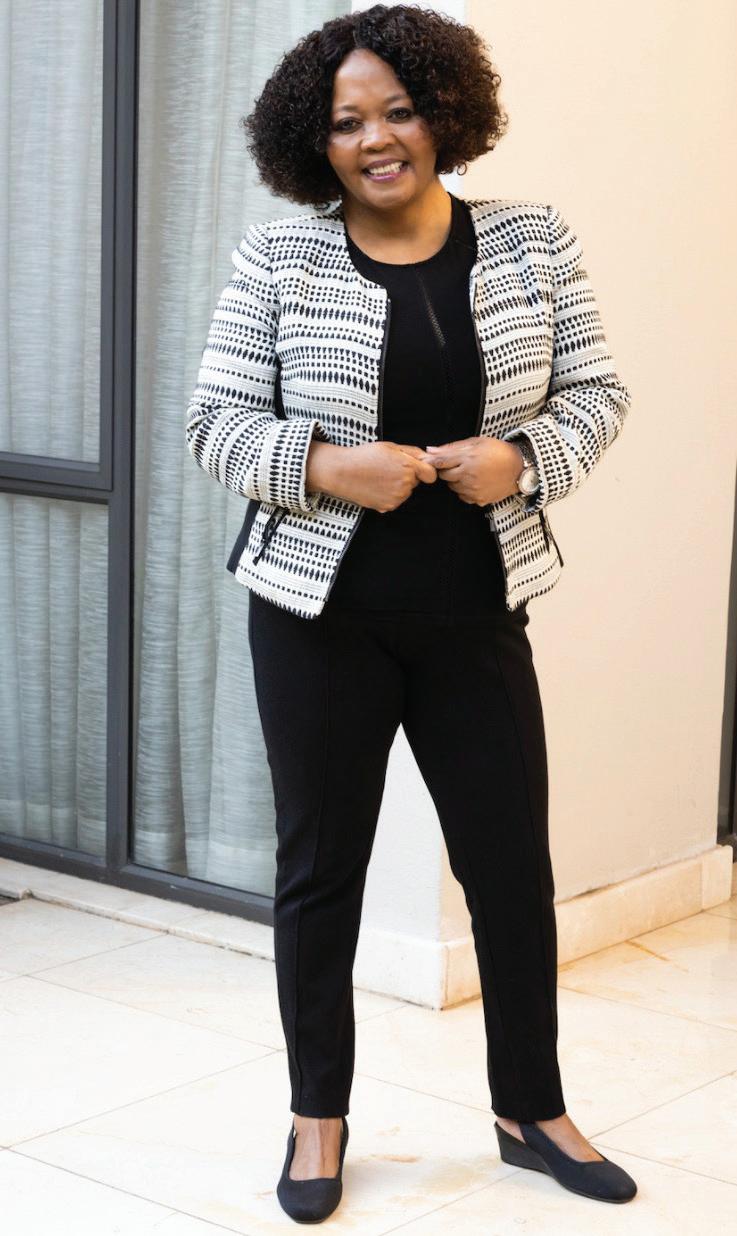
7 minute read
From the desk of the Founder - Nene Molefi writes
Welcome to the inaugural issue of our DEI in the Global South digital magazine. As you go through the different sections, you will find a wide selection of articles, stories, lessons and perspectives from a diversity of people in the Global South
The rationale behind the magazine launch
The objective of this publication is to offer a platform that curates ideas, information and lessons that can be exchanged amongst practitioners while advancing work of Diversity, Equity, Inclusion (DEI) within our respective countries. More specifically, it will highlight the work that is taking place across countries in the Global South nations.
Many case studies, models and perspectives of DEI are of work undertaken by countries in the Global North. Additionally, numerous research papers and publications on the topic tend to reference academics who are based in the Global North - yet there is a substantial body of knowledge from leaders of organisations, practitioners and academics from the regions of Africa, Asia and Latin American whose work has not been fully explored and acknowledged.
I have been working in the field of Diversity, Equity, Inclusion and Transformation (DEIT) for over two decades during which, my focus has expanded towards a belief in ‘Whole System Culture Change’. This is a result of the appreciation that an effective and impactful DEI strategy must go beyond workshops and commemoration of certain events, such as Youth Day,International Women’s Day, Disability Day, etc.
Additionally, it has always been my intention to learn about global perspectives rather than being insular in my thinking and practice. I consider Mandate Molefi fortunate that it has forged a global footprint that compels us to constantly seek ways of improving our understanding, and be globally aware while remaining relevant to locally based businesses. My hope is that this magazine will attract submissions from the broader Global South.
The reason this inaugural issue focuses on leaders and stories from South Africa is, firstly, because the country has many stories and models of DEI from its history with apartheid and postdemocracy transition. Secondly, from this, we can locate common threads that are relevant across the Global South. This edition features leaders whom I have personally worked alongside, whom are constantly seeking innovative ways of practicing their craft and have successfully navigated the complex terrain of creating diverse, equitable and inclusive societies where all can thrive. The next issue will feature work done in countries such as Botswana, Kenya, Pakistan and India. Again focusing on leaders, practitioners or organisations that my global network and team have firsthand experience with.
About my personal involvement
I began my DEI practitioner career in South Africa as an employee and moved to management positions in several organisations. During the transition from management to executive working within an organisation, to specialist consultant that operates across multiple sectors and countries, I have gathered volumes of data, documented many personal experiences of leaders, read case studies, undertaken surveys, and facilitated thousands of workshops with people from different industries and sectors, in public and private entities, higher education as well as nonprofit organisations.
This background has provided me with invaluable information that I share in this publication. My book titled ‘A Journey of Diversity and Inclusion in SAGuidelines for Leading Inclusively’, contains more of the lessons that DEI work has taught me in building sustainability within communities.
I am one of the three co-authors of the ‘Global Diversity, Equity and Inclusion Benchmarks: Standards for Organisations Around the World’. This project allowed me to interact with 112 practitioners across the world who served as expert panellists on the global benchmarks, and learn about work being achieved in other parts of the world.

Mandate Molefi’s network of experts provide another source for the exploration of more stories and perspectives. Although I work in different parts of the world, I cannot speak on behalf of other countries; even those within the African continent. I have always resisted the idea that one person can speak for and has answers for the entire continent as that would devalue indigenous knowledge, and ignore local wisdom and thought leadership from those countries. As such, we will be deliberate in engaging corporate leaders, professionals, academics and community leaders from across the Global South.
What you can expect from the articles
DEI is more than just inwardly focused. We often think about DEI as what various organisations are doing internally; but these are a microcosm of the societies they operate in, therefore creating inclusive economies should also be a priority if we want a sustainable solution. What is the purpose of talking about inclusion when there is hunger and devastation around us? There are two articles from Dr Imtiaz Sooliman and Mrs Zanele Mbeki (just to name a few), which focus on the broader society as opposed to a specific organisation.

Their work in uplifting the most vulnerable among communities is critical if we are to talk about inclusive economies
The section that invites readers to share articles, case studies, and perspectives will ensure that we do not only write about what my team and I have experienced and learned, but will also share and learn from others who are doing phenomenal work in this field. So, even if you are based in the Global North but you know of great DEI work being done in the South, you are most welcome to submit an article, share a lesson that you gained or tell us about a great author or book that you have come across from any country in the Global South.
What do I hope the magazine achieve?
This magazine should be enjoyed like a collection of articles, short stories and activities that you can read and reread over time. These contain a great deal of valuable information which is generative and interactive. In a section called ‘Let Us Engage’, we will pose thought-provoking questions to which you are invited to share your perspective. Edition 2 of this publication will contain some of your responses.
My wish is for the magazine to be recognised as a DEI Lekgotla (a gathering of village leaders) to share ideas from workplaces, schools, universities, community leaders, leaders of faith-based organisations, teachers, rural and urban communities, and governments from the Global South.
About the cover page
I am particularly pleased about the diversity of leaders on this cover. There is often an erroneous assumption that DEI should be the concern of black people, or women or marginalised groups only. When I meet leaders who do not fall in that category but are committed to learning and implementing DEI strategies in their various places of influence, it gives me hope for the field. These leaders do not claim to have all the answers, but they know that DEI is integral to the effective leadership of any organisation and that it is everyone’s responsibility to promote social justice in society and to use their individual rank, power and privilege to create social justice.
How do we hope you will engage with us?
- Subscribing to the community
- Submitting article and stories
- Watching to the linked video clips
- Share your views with us
Join me on the journey of exploration learning and appreciation of the leaders from the Global South.
.

This background has provided me with invaluable information that I share in this publication. My book titled ‘A Journey of Diversity and Inclusion in SAGuidelines for Leading Inclusively’, contains more of the lessons that DEI work has taught me in building sustainability within communities.










